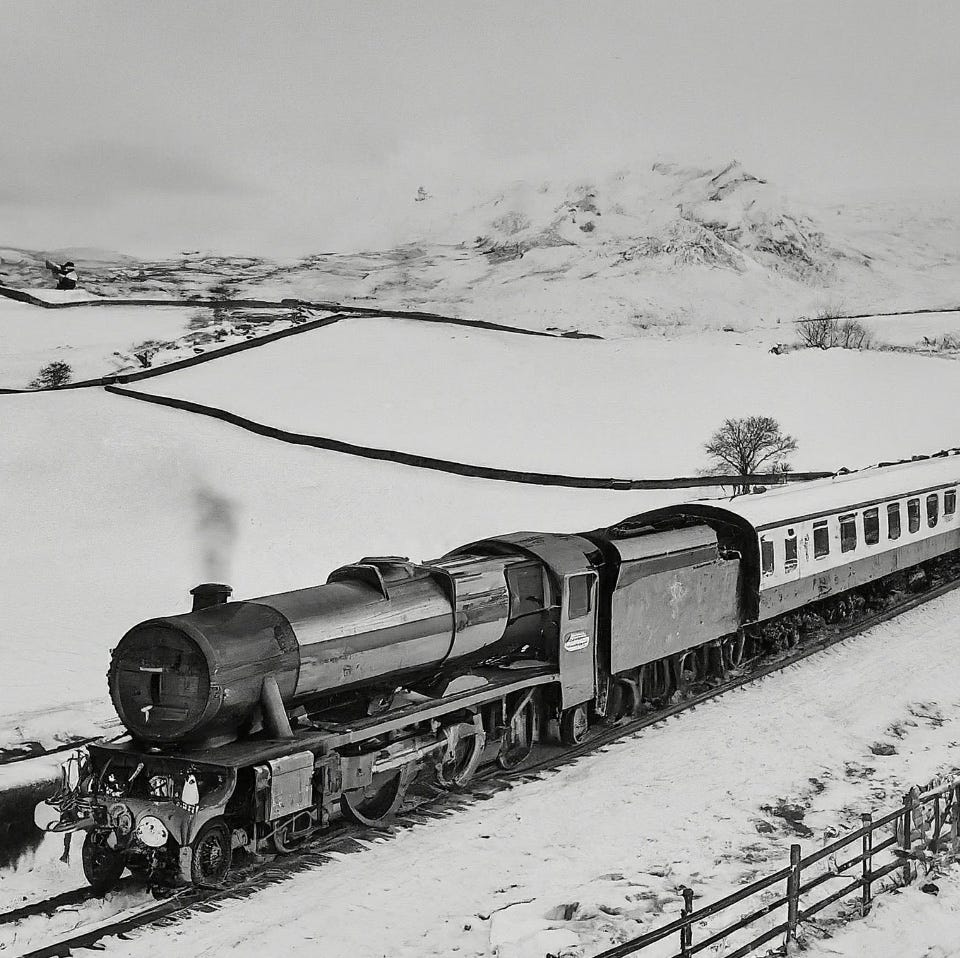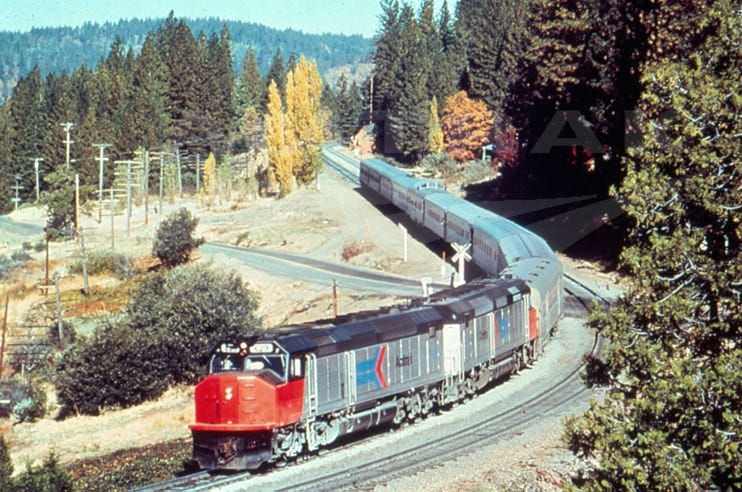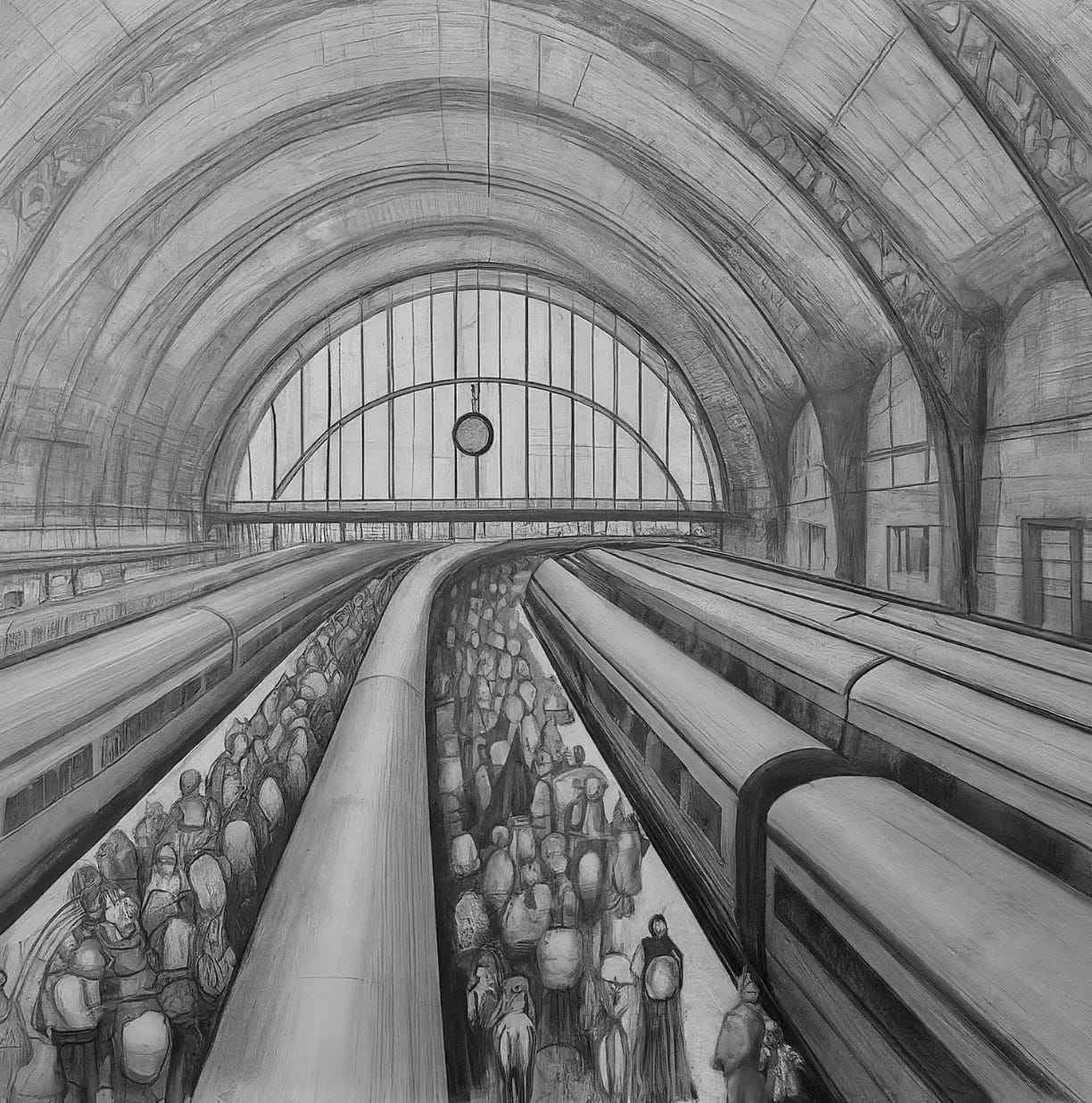Two Cheers for Trains - Part 2
From snowy train adventures in the UK to a missed American journey and disciplined platforms in China, unfolds a global tapestry of railway tales, blending travel anecdotes with cultural insights.
Lest it appears that I had memorable experiences only in India, here are some train experiences from overseas!
The Frozen Train
In January 1962, I was in my second year as a research student of astronomy at Cambridge. My research advisor was Fred Hoyle, a man of many interests. So when he proposed a walking tour of Lake District, I readily agreed. My younger brother Anant and two Sri Lankan friends also joined the party. All of us were novices at trekking in hilly regions. Fred had given suitable instructions on equipment to carry, maps etc.
Fred had booked us in the Old Dungeon Ghyll Hotel, which was well known as a haunt of mountaineers and trekkers. He had also told us how to get there. This involved going to London, taking a train at Euston Station, and changing at Crewe for Windermere. "If you take a taxi from the station to the hotel, you should get there by late evening." He concluded.
Our journey began well. Fred had indicated that we should start from Cambridge in the mid-morning. Arriving at King's Cross, we took the tube to Euston Square. However, when we reached Euston station, we found the place in utter chaos. January being the coldest month of the year, the weather forecasters had alerted against grim days ahead. Already, the train system had broken down. The train we were supposed to take was not listed. We were told that because of heavy snowfall, many trains were stranded. We were advised to 'play by the ear' and take whatever train was available going North. So we decided to remain in the waiting room and keep a watch on announcements made on the public address system or on the arrival/departure board. I was reminded of the episode of the chaos in the train station of Waterloo as described in the book "Three Men on the Boat." The trains standing at platforms were either driverless or awaiting instructions about where to go and when. As far as our train was concerned, we were assured that it was not cancelled but would be at least four hours late. How and where should we spend this time? I made a suggestion. An Indian film society was screening Hindi movies in a West End auditorium. Why not go to their show at 6 p.m.? We would have warm shelter and still have time for a snack meal in one of the many cafeterias. Everyone fell in with the suggestion.
By the time we returned to the Railway Waiting Room, it was around 11.30 p.m. The chaos continued, but the progress was that our train had appeared on the Departure Board with an estimated time of 12.00. We went to fetch our luggage. By the time we returned to the platform, a train was standing there. As the TC clipped our ticket, he advised: "I should wait about 15 minutes before boarding."
Why? Perhaps the train was being serviced? We waited impatiently. The cold weather was getting worse. Finally, we decided to ignore the TC's advice. Raj was the first to board. As soon as he got in, he came out shocked. "The compartment is all snowed under. How can we sit?" he asked. Snow inside the compartment? How is it possible? We checked a few other carriages: the same story! The Railway official to whom we complained was quite blase about it. "Don't worry, Sir! We have turned the heater on--the snow will melt in no time." He assured us.
The Train That Never Came
As a school-going kid, I was fascinated by colourful ads in the National Geographic Magazine about train travel in North America. I would dream about trains with a dining car (where I could eat at leisure), an observing gallery, a drawing room, etc. So, when I had the opportunity to travel, I decided to go for an American experience. After a few false starts, I succeeded in fitting in an overnight trip by train. Because leisurely train travel is hard to accommodate in a busy itinerary. I was visiting the Kitt Peak National Observatory (KPNO) near Tucson, Arizona, followed a week later by an astronomy symposium in Los Angeles. I was accompanied by my wife Mangala and two daughters, Geeta (age 9) and Girija (age 7). I rather prided myself in travel planning, and given all the parameters, I came up with the following itinerary. Tucson to LA had many flights but was also covered by railway. On Day 1, late afternoon, we could board the long-distance train at Tucson. We should arrive in Los Angeles around 8 am on Day 2. Here I had my brilliant idea. A family friend (Vaman Ganu) had already offered to accommodate us in his apartment in LA, and he was also happy to take the four of us on a tour of Disneyland on one of those days. I persuaded him to take us to Disneyland on arrival at the LA train station. This plan had, as one can see, many practical advantages such as time-saving, reduction in expenses, and 'child satisfaction.'
It now remained to reserve a bedroom and drawing room for our family of four on the specific train. Mangala went to do the booking at the Amtrak office in the station. Unlike crowded booking windows in India, it was a relief to see empty benches for those waiting. As she was leaving with the booking documents, the man in the window gave her a printed sheet of telephone numbers. "Call this number on the date of departure about six hours before the scheduled time to check if everything is OK." She put the pamphlet in her handbag and thought no more about it. I was happy that progress had been made towards my train mania. My enthusiasm was shared by my daughters--the girls were pouring over colourful picture books on the world's famous trains. However, whenever I mentioned my plan to my American colleagues at the observatory, I got a rather cool response. In this day and age, why go by train when the faster option of air travel is available, they asked. Of course, they had never travelled by long-distance train. So, I ignored their criticism. But I could not ignore the comments of the KPNO Director, Geoffrey Burbidge. Geoff was a good friend, a much-travelled man who had visited us in India. Geoff's first reaction was to say: "You must be joking!" When I quoted sentences from the Amtrak brochure and asked what was wrong with it, he replied that over the years, the railways had declined in quality and quantity, and this led to a decline in their usage and earning capacity. Given the lack of funds, improvements were hard to make. Still, he had some practical advice. He said: "Call your train dependent, Plan A. If the train does not work out, call me, and I will arrange, through my travel agents, your air travel to LA. Call it Plan B." I agreed, and with still a couple of days to go, we kept contacting the Rail Road office to check on the train. Yes, the train was on schedule, we were told.
As the day of departure approached, we kept our fingers crossed. Then Mangala recalled that she was to call a number to know the progress of the train. She got through and was informed that the train was in El Paso, Texas. It was running some four hours late. Rather than make up for time lost, traffic conditions suggested that it would lose a further two hours! With this information, we decided to scrap Plan A and go for Plan B. That was a sad decision, but what can you do in the face of reality?
Discipline on the Platform
I end on a happier note. It was during my visit to China, which was being hosted under an exchange program between the national science academies of India and China. I looked forward to it as I wanted to meet Chinese cosmologists, especially those with whom I had direct interaction previously. The Chinese hosts had also kindly extended their hospitality to my wife. As our visit was going to be close to the Olympic games, however, we were told that because of the tourist pressure, Beijing could not be in our itinerary. But otherwise, our China tour remained memorable.
Since our visit took us to smaller places as well as large cities, we had good exposure to the trains in China. As expected, a train going to a major city like Shanghai or Nanjing attracted a larger quota of passengers. But we were taken aback to see the sea of humans extending beyond the station building. Mangala and I had seen several stations in India flooded with humans; but what we were facing here was way above that!
How did we expect to negotiate our way to the correct seat reserved in the correct carriage of the correct train in the ten minutes or so left? "Should we have come half an hour earlier?" I asked our guide from the Chinese academy?" "That would not have helped," he replied and explained further. "The station staff will admit you to the platform only a specified time before your scheduled departure. But don't worry, Sir, you will soon see how this crowd clears when the previous train departs." Sure enough, soon the crowd began to work its way down a wide entrance to the tunnel to the "correct platform." There was no panic, and the entire movement had military precision. I could not help contrasting it with the pandemonium in an Indian train, whether it was running in Mumbai suburbs or carrying party members from Burdwan to Howrah. The exercise was repeated when exiting from a station at the end of the journey.





Excellent stories. I remember my college days, when I used to read stories from Dr. Narlikar. And, it was a real pleasure to host him and Madem in Los Angeles.
love your train stories, thanks for sharing